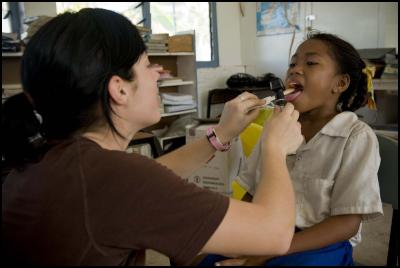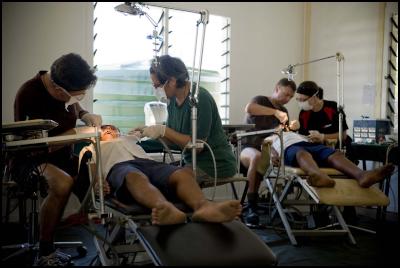Healthy Soldiers, Healthy Population In Cook Is

Click to enlarge
Private Sophie Woodman carries out a health survey on one of Pukapuka’s school children during Exercise Tropic Twilight in the Cook Islands.
New Zealand Defence Force
Te Ope Kaatua O Aotearoa
Media Release
10 June 2009
Healthy Soldiers, Healthy Population In The Cook Islands
Health in one way or another has always been part of military operations whether it is ensuring the soldier has good feet to walk on, good teeth to eat with, or good water to drink.
Exercise Tropic Twilight underway on Pukapuka in the Cook Islands and involving 57 NZ Army engineers and medical personnel has provided an opportunity to test the medical team’s deployment capability into a remote tropical environment. The deployment has also enabled the team to provide assistance to our Pacific neighbours as they work with the Cook Island Ministry of Health.
A team of eight Ministry of Health personnel joined the land forces onboard HMNZS Canterbury in Apia, Samoa. The NZDF Primary Healthcare Team is working with Ministry of Health personnel to conduct a health survey of 18 to 65 year olds and all school children, to determine the extent of several major risk factors for common non-communicable diseases like heart disease and diabetes.
Disease risk factors include high blood pressure, obesity, lack of exercise, poor diet, age and the use of tobacco and alcohol. All survey participants will be required to answer a series of interview questions before seeing medical personnel to have their height, weight and blood pressure measured. Local government health workers have been working alongside the NZDF medical contingent to identify the most effective use of the information that is being collected.
The Primary Healthcare Team will also be conducting Pap Smears, for the early identification and treatment of cervical cancer.
A Medical Scientific Officer has also been deployed with the team to process blood samples. Blood tests are being conducted to record blood sugars and fats. The tropical heat has posed a major challenge for the successful function of laboratory facilities. Maintaining the blood fridge temperature at 1-4 Degrees Celsius has been achieved by cooling the exterior of the fridges with fans that are constantly operating.
A NZ Army Territorial Force team of three dentists and five support staff from 2nd Health Support Battalion has been carrying out checks for all school age children and has carried out procedures on islanders who have been found to need dental work or dentures.
The remote location of Pukapuka means that knowledge of first aid could save a life. The First Aid Training Team is conducting two courses in the application of first aid, with the first of the courses successfully qualifying 12 residents of Pukapuka in basic first aid. The second course of 12 students is due to commence this week..
All information gathered during Tropic Twilight is for the use of the Cook Island Ministry of Health. The information will be essential for follow up care, and enable them to develop public health programs that are relevant to the needs of Pukapuka.
ENDS

Click to enlarge
Pukapuka’s school age children receive a thorough dental check up from the NZ army dental team during Exercise Tropic Twilight. L - R Major James Hannah, Staff Sergeant Delwyn Roberts, Lieutenant Colonel Warren Duncan, and Corporal Renee Nattrass
The New Zealand Defence Force is actively working with NZ Government departments including NZAid throughout the world. Currently 773 New Zealand Defence Force personnel are deployed on 14 operations, UN missions and defence exercises in 10 countries around the globe.
--
Background
The medical team is
made up of five task groups; Force Health Protection Team,
Primary Healthcare Team, Dental Team, First Aid Training
Team and the Field Treatment Centre
Environmental Health has been an element in most deployments, however Force Health Protection is a relatively new concept for the NZ Army, and is focussed on proactively identifying health risks to remedy, mitigate or avoid them before personnel deploy into an area.
A preliminary health evaluation was conducted by the Force Health Protection Team (FHPT) during the initial reconnaissance on Pukapuka in 2008. This included looking at the availability and cleanliness of local water and food supplies, identifying waste management possibilities for deployed forces, identifying local health facilities and their capability, and medical evacuation options.
During the early stages of land forces lodgement on Pukapuka, the FHPT checked the accommodation and working areas of NZDF personnel for the presence of hazardous substances. Throughout the exercise, residual sprays and pesticide fog will be used to reduce the threat of disease vectors like mosquitoes and other insects. Monitoring the temperature and humidity has become an essential task to manage the effect the climate is having on personnel. The team is also working with the local Health Protection Officer to identify potential health protection issues such as their water catchments and storage, vector control and conduct sanitary surveys.
Facts about Pukapuka
Population 530 and is 5.1 sq km and is one of the most
remote and isolated of all the Cook Islands. Pukapuka lies
1150 km north of Rarotonga and was discovered 2000 years ago
by Samoan and Tongan voyagers on their way to the Society
Islands It was not until 700 years ago that Pukapuka was
permanently settled.
Pukapuka’s isolation was ameliorated in 1994 when an airstrip was built on Moto Ko and telephones introduced to the island in 1994.
Pukapuka sustained severe damage during the cyclones that tore through the islands in 2005 and only 10 houses survived the storms without major damage. Taro crops were washed away and the many of the islands water sources were contaminated prompting a huge rescue package to be implemented by the Cook Island Government and aid agencies from New Zealand and other countries. The island is only just beginning to stagger back on its feet but it could take another two years before the taro plantations and water sources have fully recovered.
Daily life today in Pukapuka is dominated by fishing, farming and harvesting of local crops such as coconuts, bananas and papayas. Most of the produce is consumed on the island with the remainder being exported back to Rarotonga.
The only landing place is reached by narrow passages through the reef on the western side of Wale – the northern most island.
ENDS


 Gordon Campbell: On Why The US Stands To Lose The Tariff Wars
Gordon Campbell: On Why The US Stands To Lose The Tariff Wars Te Pāti Māori: Ngarewa-Packer - Fast-Tracking Seabed Mining Ignores Māori Opposition And Environmental Precedent
Te Pāti Māori: Ngarewa-Packer - Fast-Tracking Seabed Mining Ignores Māori Opposition And Environmental Precedent New Zealand Defence Force: Defence And Customs Strengthen Maritime Security With Uncrewed Surface Vessels
New Zealand Defence Force: Defence And Customs Strengthen Maritime Security With Uncrewed Surface Vessels SPCA: Huge Win With New Dog Tethering Regulations
SPCA: Huge Win With New Dog Tethering Regulations Community Housing Aotearoa: Ngā Wharerau o Aotearoa Says New Partnership Model Helping Ensure Right To A Decent Home Is Realised
Community Housing Aotearoa: Ngā Wharerau o Aotearoa Says New Partnership Model Helping Ensure Right To A Decent Home Is Realised Greenpeace Aotearoa: Babies At Risk Due To Nitrate-Contaminated Drinking Water In Ashburton District
Greenpeace Aotearoa: Babies At Risk Due To Nitrate-Contaminated Drinking Water In Ashburton District Driving Change Network: Response To Government’s Proposed Driver Licensing Changes
Driving Change Network: Response To Government’s Proposed Driver Licensing Changes


